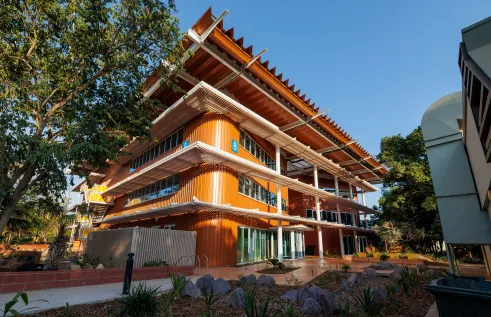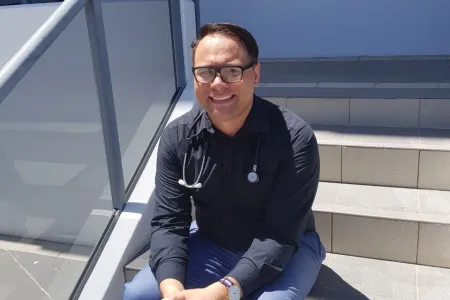CDU PhD student receives Google’s backing to help Close the Gap
Australian research aimed at closing the gap in First Nations health outcomes through new and emerging technologies like AI has received the backing of Google.
One of only six recipients of the 2024 Google PhD Fellowship in Australia, Charles Darwin University PhD student and Bundjalang man Luke Hamlin will receive $15,000 and professional mentorship from Google to explore the application of culturally informed, technology-driven solutions to achieve greater health equity in rural and remote First Nations communities.
Tasked with supporting the rollout of the COVID-19 vaccine as part the Aboriginal and Torres Strait Islander Advisory Group, Luke said the use of mRNA vaccines and telehealth services during the pandemic was the “gamechanger” that inspired his PhD.
“The pandemic showed us just how agile we can be – we can overcome challenges in a crisis, do things differently, and, in many cases, better than we have done before,” he explained.
“Increasing STEM literacy and empowering First Nations communities to make informed choices about their health, and on their terms, is going to go a long way to boosting engagement with new and emerging technologies so that the health gap doesn’t widen, and our people don’t fall further behind.”
According to the Australian Institute of Health and Welfare, the burden of disease for Aboriginal and Torres Strait Islander people is 2.3 times higher than non-Indigenous Australians.
That burden increases further for First Nations people living in remote areas, with lower life expectancy compared to those in non-remote areas.
With recent studies identifying a lack of research on the adoption of new and emerging technologies in rural and remote First Nations communities, CDU Associate Dean Learning and Teaching, and the projects primary PhD supervisor, Bharanidharan Shanmugum, said the pandemic had served to highlight the knowledge gap even further.
“Luke’s research aims to empower First Nations communities to make informed decisions about their health by understanding their specific needs and preferences regarding technology adoption,” he explained.
“By filling this knowledge gap, we can support First Nations communities in leveraging technology to improve their health outcomes and well-being.”
Luke joins a total 85 global 2024 Google PhD Fellow recipients, including from the University of Melbourne, University of Cambridge, National University of Singapore and Princeton University.
Full list of 2024 Google PhD Fellowship recipients here.
Related Articles

2000 students filter into $30.8 million health teaching and training facility
More than 2000 students from 10 health disciplines are set to filter into Charles Darwin University’s (CDU) newly-completed $30.8 million Centre for Better Health Futures throughout 2026.
Read more about 2000 students filter into $30.8 million health teaching and training facility
First “hype cycle” of AI development put tech above humans
Users around the world have rushed to adopt artificial intelligence - especially in safety-critical fields - but a new study has revealed the hype has prioritised technology for technology’s sake instead of human-centred development.
Read more about First “hype cycle” of AI development put tech above humans
Nanoplastics hindering cognitive abilities of fish, international research shows
Nanoplastic exposure can impair the cognitive abilities of fish and could lead to significant impacts on marine species’ ability to survive, according to a new international study.
Read more about Nanoplastics hindering cognitive abilities of fish, international research shows
